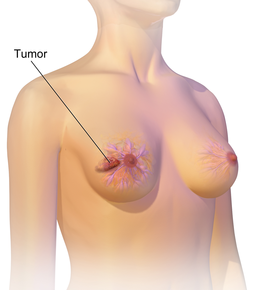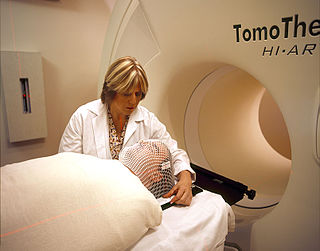Related Research Articles

Breast cancer is cancer that develops from breast tissue. Signs of breast cancer may include a lump in the breast, a change in breast shape, dimpling of the skin, fluid coming from the nipple, a newly inverted nipple, or a red or scaly patch of skin. In those with distant spread of the disease, there may be bone pain, swollen lymph nodes, shortness of breath, or yellow skin.
A radiation oncologist is a specialist physician who uses ionizing radiation in the treatment of cancer. Radiation oncology is one of the three primary specialties, the other two being surgical and medical oncology, involved in the treatment of cancer. Radiation can be given as a curative modality, either alone or in combination with surgery and/or chemotherapy. It may also be used palliatively, to relieve symptoms in patients with incurable cancers. A radiation oncologist may also use radiation to treat some benign diseases, including benign tumors. In some countries, radiotherapy and chemotherapy are controlled by a single oncologist who is a "clinical oncologist". Radiation oncologists work closely with other physicians such as surgical oncologists, interventional radiologists, internal medicine subspecialists, and medical oncologists, as well as medical physicists and technicians as part of the multi-disciplinary cancer team. Radiation oncologists undergo four years of oncology-specific training whereas oncologists who deliver chemotherapy have two years of additional training in cancer care during fellowship after internal medicine residency in the United States.

In the field of medical treatment, proton therapy, or proton radiotherapy, is a type of particle therapy that uses a beam of protons to irradiate diseased tissue, most often to treat cancer. The chief advantage of proton therapy over other types of external beam radiotherapy is that the dose of protons is deposited over a narrow range of depth, which results in minimal entry, exit, or scattered radiation dose to healthy nearby tissues.
Gynecologic oncology is a specialized field of medicine that focuses on cancers of the female reproductive system, including ovarian cancer, uterine cancer, vaginal cancer, cervical cancer, and vulvar cancer. As specialists, they have extensive training in the diagnosis and treatment of these cancers.
Breast cancer management takes different approaches depending on physical and biological characteristics of the disease, as well as the age, over-all health and personal preferences of the patient. Treatment types can be classified into local therapy and systemic treatment. Local therapy is most efficacious in early stage breast cancer, while systemic therapy is generally justified in advanced and metastatic disease, or in diseases with specific phenotypes.
The American Society of Clinical Oncology (ASCO) is a professional organization representing physicians of all oncology sub-specialties who care for people with cancer. Founded in 1964 by Fred Ansfield, Harry Bisel, Herman Freckman, Arnoldus Goudsmit, Robert Talley, William Wilson, and Jane C. Wright, it has nearly 45,000 members worldwide.

Cancer can be treated by surgery, chemotherapy, radiation therapy, hormonal therapy, targeted therapy and synthetic lethality, most commonly as a series of separate treatments. The choice of therapy depends upon the location and grade of the tumor and the stage of the disease, as well as the general state of the patient. Cancer genome sequencing helps in determining which cancer the patient exactly has for determining the best therapy for the cancer. A number of experimental cancer treatments are also under development. Under current estimates, two in five people will have cancer at some point in their lifetime.
Kenneth Offit is an American cancer geneticist and oncologist. He is currently Chief of the Clinical Genetics Service at Memorial Sloan Kettering Cancer Center, a member of the Program in Cancer Biology and Genetics at the Sloan-Kettering Institute, and Professor of Medicine and Healthcare Policy and Research at Weill Cornell Medical College. He is also a member of both the Board of Scientific Counselors of the National Cancer Institute and the Evaluation of Genomic Applications in Practice and Prevention working group of the U.S. Centers for Disease Control. In 2016, he was elected as a Member of the National Academy of Medicine. In 2018, he was named a Fellow of the American Society of Clinical Oncology.
Joaquín Gómez Mira is a scientist and physician specialized in radiation oncology. Born and raised in Spain, he completed his studies and developed his career in the United States, where he moved in 1967. He is a member of the American Society of Clinical Oncology, and a Fellow and appointed councilor of the American College of Radiology. His work, achievements and lectures in the field of radiation oncology are held in high regard.
Walter "Wally" J. Curran, Jr. is an American radiation oncologist specializing in the treatment of malignant brain tumors and locally advanced lung cancer. He is the global chief medical officer of GenesisCare, a provider of cancer and cardiovascular care that serves communities in 440 locations across the world.
Eleanor D. Montague was an American radiologist and educator who established breast-conserving therapy in the United States and improved radiation therapy techniques. She became a member of the Texas Women's Hall of Fame in 1993.
Sonja Eva Singletary was an American surgeon who specialized in the care of breast cancer. She was a faculty member at the University of Texas MD Anderson Cancer Center and a past president of the Society of Surgical Oncology.
Maha H. Hussain is the Genevieve E. Teuton Professor of Medicine and deputy director of the Lurie Comprehensive Cancer Center at Northwestern University's Feinberg School of Medicine. She is an oncologist focusing on genitourinary cancers.

Edith Peterson Mitchell is a retired Brigadier general of the United States Air Force and an oncologist. She is clinical professor of medicine and medical oncology at Thomas Jefferson University. In 2015, she became the president of the National Medical Association.
Laurie E. Gaspar is a professor emerita in the department of radiation oncology at the University of Colorado. She specializes in lung cancer and brain tumors. She is currently the treasurer for the American Society for Clinical Oncology.
Reshma Jagsi is an American radiation oncologist. She is the Newman Family Professor and Deputy Chair in the Department of Radiation Oncology and Director of the Center for Bioethics and Social Sciences in Medicine at the University of Michigan. Overall, she is the author of over 350 published articles in peer-reviewed medical journals and continues scholarly research in three primary areas of interest: breast cancer, bioethics, and gender equity, with the support of grants from the National Institutes of Health (NIH), the Doris Duke Charitable Foundation, and the Susan G. Komen Foundation, for which she serves as a Senior Scholar.
Everett E. Vokes is an American oncologist. He is the John E. Ultmann Professor, chair of the Department of Medicine, and physician-in-chief at the University of Chicago Medical Center. In this role, he pioneered the combination radiation and chemotherapy as first-line treatment for head and neck cancer.
Stephanie Lynn Schutt Graff is an American breast medical oncologist. She is the Director of both the Breast Program and Clinical Research at Sarah Cannon Research Institute at HCA Midwest Health at Sarah Cannon Research Institute and Associate Director of the Breast Cancer Research Program at Sarah Cannon Research Institute.
Mary K. Gospodarowicz Evans is a Canadian oncologist. She is a University Professor at the University of Toronto and Medical Director at the Princess Margaret Cancer Centre.
Beth Young Karlan is an American gynecologic oncologist. In 2008, she was named Editor-in-chief of the medical journals Gynecologic Oncology and Gynecologic Oncology Reports. In 2012, Karlan was appointed by the White House to serve on the National Cancer Advisory Board, and in 2015, she was elected to the National Academy of Medicine.
References
- ↑ ASCO. "Lori J. Pierce, MD, FASTRO, FASCO." https://www.asco.org/people/lori-j-pierce-md-fasco?fbclid=IwAR17v0aRie_vWGKtBesUBy1Xg22DDC27GbOA2-EklN4d8t7Q3V7HBQFnYtA
- 1 2 3 4 5 "Radiation Oncologist Lori J. Pierce, MD, FASCO, FASTRO, Enjoys Balancing Administrative and Clinical Roles". ascopost.com. The ASCO Post. June 3, 2017. Retrieved February 15, 2021.
- ↑ "Melvin H. Pierce". Philadelphia Daily News. March 12, 1990. Retrieved February 15, 2021– via newspapers.com.
- ↑ Blue, Helen (March 17, 1975). "Top Black Scholars Tapped". Philadelphia, Pennsylvania: Philadelphia Daily News. p. 14. Retrieved February 15, 2021– via newspapers.com.
- 1 2 Piana, Ronald (July 25, 2019). "A Compassionate Family Doctor Sparked an Interest in Medicine for Lori Pierce, MD, FASTRO, FASCO". ascopost. The ASCO Post. Retrieved February 15, 2021.
- 1 2 3 4 "Lori Pierce, MD". medicine.umich.edu. Retrieved February 15, 2021.
- ↑ Pierce, Lori; Fowble, Barbara; Solin, Lawrence J.; Schultz, Delray J.; Rosser, Cynthia; Goodman, Robert L. (June 1, 1992). "Conservative surgery and radiation therapy in black women with early stage breast cancer. Patterns of failure and analysis of outcome". Cancer . 69 (11): 2831–2841. doi: 10.1002/1097-0142(19920601)69:11<2831::AID-CNCR2820691132>3.0.CO;2-J . PMID 1571914 . Retrieved February 15, 2021.
- ↑ "134 receive tenure". ur.umich.edu. May 20, 1998. Retrieved February 15, 2021.
- ↑ "Radiation therapy may be safe for women with breast cancer gene mutations". ur.umich.edu. December 4, 2000. Retrieved February 15, 2021.
- ↑ Brown, Kevin (September 7, 2005). "Pierce named associate provost". ur.umich.edu. Retrieved February 15, 2021.
- ↑ "Accolades". ur.umich.edu. September 7, 2010. Retrieved February 15, 2021.
- ↑ "Lori Pierce, MD honored by United Way". medicine.umich.edu. April 18, 2017. Retrieved February 16, 2021.
- ↑ "ASCO to recognize leaders for outstanding contributions in cancer care". ihpi.umich.edu. May 9, 2018. Retrieved February 16, 2021.
- ↑ "ASCO President-Elect Dr. Lori J. Pierce Inducted Into National Academy of Medicine". asco.org. ASCO. October 21, 2019. Retrieved February 16, 2021.
- ↑ "Lori Pierce, MD elected president of ASCO". medicine.umich.edu. January 9, 2019. Retrieved February 15, 2021.
- ↑ Fawcett, Nicole (December 10, 2020). "Radiation Side Effects in Young and Black Patients Often Missed". rogelcancercenter.org. Retrieved February 16, 2021.
- ↑ "Tackling Health Inequities in Cancer Care: An Interview with ASCO President Dr. Lori Pierce". bcrf.org. Breast Cancer Research Foundation. August 21, 2020. Retrieved February 16, 2021.